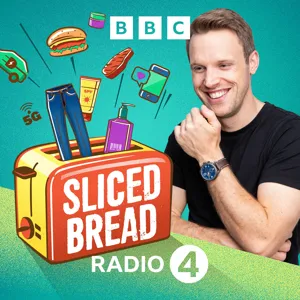Podcast Summary
Vacuum cleaner innovation: Vacuum cleaners evolved from large, invasive horse-drawn models to modern, lightweight designs, improving accessibility and convenience for households through continuous innovation.
Vacuum cleaners have come a long way since their bulky, horse-drawn beginnings. The first vacuum cleaner, invented by James Murray Spangler and commercialized by Hoover, was a significant improvement over the large, invasive horse-drawn versions. Graham Caprentay, known as the "father of floor care" or "Mr Vacuum," has been involved with vacuum cleaners for over 60 years and played a crucial role in their development. Nick Gray, the inventor and founder of GTEC, also shares his experience working under Graham Caprentay's guidance. The vacuum cleaner industry has seen numerous innovations, from the first upright vacuum cleaner to modern, lightweight designs. These advancements have made vacuuming more accessible and convenient for households, demonstrating the power of continuous improvement and innovation in everyday products.
Cordless vacuum cleaners: Nick O'Donohoe founded Gtech with a goal to create effective and energy-efficient cordless vacuum cleaners, leading to the successful Air Ram model. Despite challenges during the pandemic, addressing consumer needs for multiple cleaning tasks and efficient cordless alternatives drove Gtech's success in the UK market.
Nick O'Donohoe, the founder of Gtech, was driven by a desire to create cordless vacuum cleaners that were effective and energy-efficient, as traditional models were using excessive power and consuming large amounts of electricity. He started by designing an electric dustpan and brush, which was successful and led him to create the Air Ram cordless vacuum cleaner in 2012. Gtech's business has had ups and downs, particularly during the COVID-19 pandemic when people spent more time at home and invested in appliances, but faced challenges due to economic instability. The UK is one of the biggest markets for vacuum cleaners outside of the US and China, with around 5 million units sold annually, worth approximately 800 million pounds. Consumers tend to buy multiple vacuum cleaners for different cleaning tasks in the home. Gtech's success came from addressing these issues and providing efficient, cordless alternatives.
Vacuum cleaner features: Effective vacuum cleaning involves high suction power, good airflow, and multifunctionality. Lightweight design and various types like robot and handstick models offer different benefits.
Vacuum cleaners are not just about high suction power, but also about airflow and multifunctionality. Consumers might not realize that airflow is crucial for effective cleaning, and that lightweight convenience is also important. Additionally, there are various types of vacuum cleaners, such as robot and handstick models, which offer different benefits. It's also worth noting that there is extensive testing involved before vacuum cleaners hit the market. For instance, the Vax vacuum cleaner was a game-changer as it revitalized the market by offering innovative features and design. Overall, understanding these aspects can help consumers make informed decisions when purchasing a vacuum cleaner.
Vacuum Cleaner Industry Innovations: Entrepreneurs disregarded economic rules to deliver superior vacuum cleaners, leading to game-changing innovations like the first wax carpet cleaner above £100 and bagless vacuum cleaners.
Innovative pricing and game-changing technologies have significantly shaped the vacuum cleaner industry. Alan Brazier's introduction of the first wax carpet cleaner above £100 in the 1970s allowed Vax to capture half the market. Later, Dyson's bagless vacuum cleaners in the 1990s revolutionized the market, despite initial drawbacks like exposure to dust. Both entrepreneurs disregarded economic rules to deliver superior products. Looking ahead, maintenance-free vacuum cleaners, which require minimal user intervention, are the next frontier in the industry. The Hoover Constellation, an unusual vacuum cleaner from the 1950s, showcases the continuous innovation in this space.
Vacuum Cleaner Innovations: The vacuum cleaner industry has shifted towards robot models with improved cleaning efficiency and smart technology, but the focus remains on perfecting fundamental functionality and low maintenance.
While some vacuum cleaner innovations, like the famous "Prowler" that floated on a cushion of air, were flawed in their design but highly profitable, the industry has since shifted towards more advanced technologies such as robot vacuum cleaners that charge themselves using ambient light and offer improved cleaning efficiency and smart technology. However, the focus is still on perfecting the fundamental functionality and low maintenance of vacuum cleaners before delving deeper into robotic models. Other companies are also investing in incremental improvements, such as longer battery life and smart technology, to enhance consumer experience. Despite some failed innovations in the past, the vacuum cleaner market continues to evolve, offering consumers more efficient and convenient solutions for maintaining clean homes.
Multi-functional cleaning tech: Future cleaning tech focuses on multi-functionality and innovation for various floor types and surfaces, including robot vacuums that clean windows, walls, and climb stairs, advancements in air filtration and self-vibrating carpets, and human-shaped robots and advanced materials.
The future of cleaning technology is focused on multi-functionality and innovation to cater to various floor types and household surfaces. Robot vacuum cleaners with the ability to clean windows, walls, and climb stairs are a possibility, but challenges in miniaturization remain. Additionally, advancements in air filtration systems and self-vibrating carpets could reduce the need for traditional vacuuming. The use of human-shaped robots and advanced materials are also potential game-changers in the industry. Overall, the trend is towards smart, versatile cleaning solutions that make household chores more convenient and efficient.
Unexpected topics in The Infinite Monkey Cakes: The series explores various intriguing topics from winning strategies for board games to the possibility of alien life and unearthed science history.
Learning from the new series of "The Infinite Monkey Cakes" is the exploration of unexpected and intriguing topics, ranging from winning strategies for board games like Monopoly and Kudos, to the possibility of alien life originating from Glastonbury, the fascination of trees as discussed with Judy Dench, and the unearthed history of science presented by Rufus Hound and other esteemed guests at the Royal Society. The series offers a mix of science, humor, and intrigue, promising to surprise and delight listeners with its unexpected yet thought-provoking content. Be sure to tune in first on BBC Sounds.
